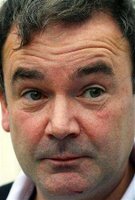
We are only a year and a bit into the current Parliament, but already 11 Labour MPs have announced they will not be contesting the next General Election. Tribune's Barckley Sumner has posted the full list on
Labour Home.
As Barckley himself notes, one name not currently on the list is that of Tony Blair, but it is widely assumed that, in view of his decision not to fight a fourth election as leader, he will not be contesting Sedgefield again either. Indeed, his agent John Burton appeared to confirm this in an interview with the Newcastle Journal's Ross Smith about 18 months ago.
The practice of former Prime Ministers standing down at the election immediately following their departure from No 10 is a relatively recent constitutional development. Margaret Thatcher started it, leaving the Commons in 1992, two years after her defenestration as Premier.
Likewise, her successor John Major, who famously took the view that when the curtain falls, it's time to leave the stage, quit the Commons as soon as decently possible, at the 2001 election which followed his landslide defeat at the hands of Mr Blair in 1997.
But there are other historical precedents. David Lloyd George, who was ousted as Premier in 1922, stayed on as an MP for a further 23 years, while Winston Churchill remained on the backbenches for nearly a decade after his retirement from No 10, and was pushing 90 when he finally left the Commons at the 1964 election.
More recently, Sir Edward Heath stayed on for 27 years after his eviction from No 10 before stepping down in 2001. It became known as "the longest sulk in history," but I suspect he was motivated not only by a determination to outlast Thatcher, but by a genuine desire to see the Tory Party return to the sort of centrist politics he espoused.
Sadly for him, he died only a matter of months before David Cameron took over as party leader and began the long march back to the centre ground.
I suspect that Sir Edward's example is one that subsequent premiers have been keen to avoid. But nevertheless, I am by no means sure that ex-premiers leaving the Commons at the first available opportunity is necessarily a good thing for the country.
I think our national legislature is much the poorer for the loss of the accumulated wisdom of those who have "been there and done that." It also makes politics less interesting.
I would have paid good money to hear John Major, whose government New Labour successfully tarred with the brush of sleaze even though it only ever involved very minor figures, ask Mr Blair a PMQ about the cash for honours affair which, by all accounts, will shortly result in him being
personally questioned by Scotland Yard.
It's also a shame from her own point of view that Mrs Thatcher was not in the Commons when Britain was forced out of the ERM. She had, after all, always resisted joining, only being persuaded to do so by Mr Major and Douglas Hurd, and it is just about conceivable that she could have got her old job back.
Perhaps the wisest example to follow is that of those former premiers who opted for a happy medium, staying on till the election after next following their initial departure from office.
These include Harold Wilson, although he slightly blotted his copybook by voting for Michael Foot rather than Denis Healey in the 1980 Labour leadership election, and James Callaghan who stayed on until 1987.
When Churchill died in January 1965, Wilson, who was then Prime Minister, concluded his tribute in the House with the words: "We in this House, at least, know the epithet he would have chosen:
He was a good House of Commons man."
Sadly, that could never be said of Tony Blair. And his contempt for the institution is reflected in his decision - if such it be - to leave it.

 There has been much speculation of late as to the fate of Treasury minister and Gordon Brown first lieutenant Ed Balls following the Boundary Commission's decision to do away with his Normanton constituency. Well, I reckon the answer lies in this recent post on Labour Watch.
There has been much speculation of late as to the fate of Treasury minister and Gordon Brown first lieutenant Ed Balls following the Boundary Commission's decision to do away with his Normanton constituency. Well, I reckon the answer lies in this recent post on Labour Watch.